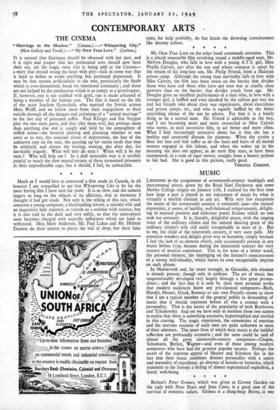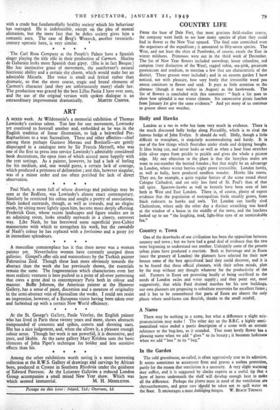MUSIC
LISTENING to the progrimme of seventeenth-century madrigals and instrumental pieces, given by the. Boyd Neel Orchestra and some Morley College singers on January 17th, I realised for the first time how large a part is played in my enjoyment of music by what 4 virtually a morbid element in any art. With very few exceptions the music of the seventeenth century is eminently-sane—the natural expression, it seems, of healthy, well-balanced temperaments, delight- ing in musical patterns and elaborate poetic fictions which no one took too seriously. It is, literally, delightful music, with the singing voice of the ordinary citizen and the natural dancing grace of the ordinary citizen's wife still easily recognisable in most of it. But to me, the child of the nineteenth century, it very soon palls. My attention wanders and delight gives way to boredom, simply because I feel the lack of an element which, only occasionally present in any music before 1750, became during the nineteenth century the very essence of musical experience. This is, for want of a better word, the personal ,element, the impinging on the listener's consciousness of a strong individuality, which leaves its own recognisable imprint on each phrase.
In -ivionteverdi and, far more strongly, in Gesualdo, this-element is already present, though only in embryo. The art of music has unquestionably developed very largely through a few great person- alities • and the factsthat it is only by their most personal works that modern audiences know any pre-classical composers—Bach, Handel, Mozart, Gluek, Rameau or our own Purcell—seems to show that I am a typical member of the general public in demanding of music that it should represent before all else a contact with a personality. That is the secret of the popularity of both Beethoven and Tchaikovsky. And yet we have only to mention those two names to realise that there is something excessive, hypertrophied and morbid in this craving. The tragic experience, the extremities of emotion and the nervous tensions of such men are quite unknown to most of their admirers. The inner lives of which their music is the faithful reflection are profoundly eccentric; and the same could be said of almost all the great nineteenth-century composers—Chopin, Schumann, Berlioz, Wagner—and even of those among modern composers who have had the greatest popular success. Perhaps the secret of the supreme appeal of Mozart and Schubert lies in the fact that their music combines distinct personality with a sanity and normality of experience, an absence of heroics or hysterics, which transmits to the listener a feeling of almost supernatural euphobria, a literal well-being. * * * * Britten's Peter Grimes, which was given at Covent Garden on the 14th with Peter Pears and Joan Cross, is a good case of the survival of romantic values. Grimes is a dung-heap Byron, at war with a crude but fundametitally healthy society which his behaviour has outraged. He is indefensible, except on the plea of mental alienation, but the mere fact that he defies society gives him a romantic aura. The case of Berg's Wozzeck, another twentieth-
century operatic hero, is very similar. • The Carl Rosa Company at the People's Palace have a Spanish singer playing the title role in their production of Carmen. Marina de Gabarain looks more Spanish than gipsy. (She is in fact Basque.) She has instinctive grace of movement, the southerner's natural histrionic ability and a certain shy charm, which would make her an admirable Micaela. Her voice is small and lyrical rather than dramatic, so that the more coarse, tragic and brutal elements of Carmen's character (and they are unfortunately many) elude her. The production was graced by the best Lillas Pastia I have ever seen, and the use of the original version with spoken dialogue is an
extraordinary improvement dramatically. MARTIN COOPER.







































 Previous page
Previous page